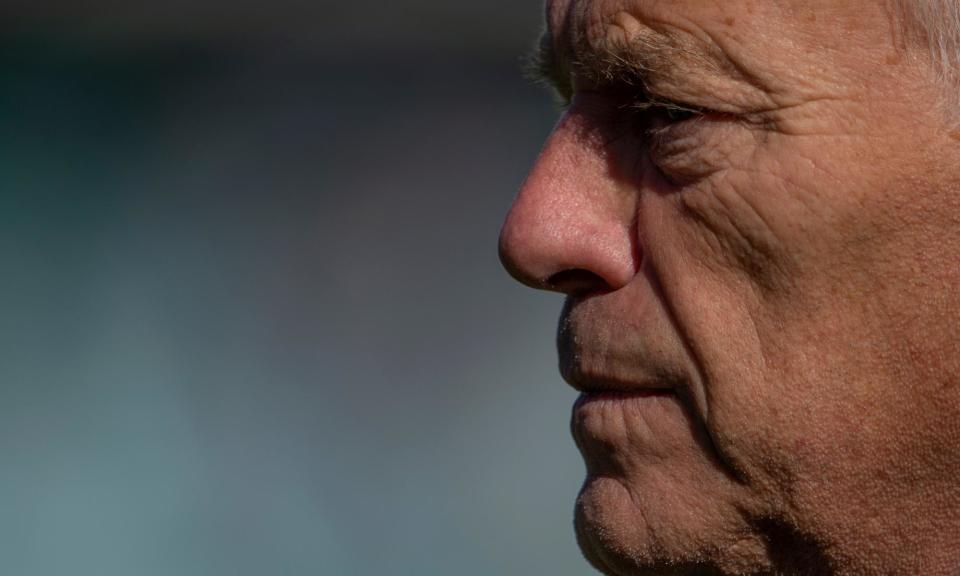
So when did the Yorkshire racism saga/crisis/scandal – take your pick – really begin to rumble? Not with Azeem Rafiq’s first public utterances. That brought only initial silence from the club, then a lengthy investigation and a half-baked apology.
In reality, change came in early November 2021 when sponsors cut their ties with the county and the England and Wales Cricket Board suspended international matches being hosted at Headingley. The money was going to stop coming in and that, allied with plenty of political commotion, forced a new beginning. Lord Patel entered as chair, backroom staff were brutally culled and hope emerged for a brand new and inclusive Yorkshire County Cricket Club.
Related: Colin Graves apologises for racism at Yorkshire after takeover approved
Now, once again, money dictates the direction of travel – this time backwards, not forward. The financial strife that has engulfed Yorkshire was laid out in their annual report last year, with £3.5m spent addressing “the findings of institutional racism against the club”, the payouts and legal fees totting up to turn the crisis existential. Thus emerged a space for the man who saved the club in 2002, chaired it and then took on the same role at the ECB from 2015 to 2020. Colin Graves will return as the club’s supposed saviour, subject to an Extraordinary General Meeting on 2 February.
The purported alternatives make him look angelic. Mike Ashley’s previous great sporting project at Newcastle brought bitterness and hatred; a dalliance with Rajasthan Royals would have been another step in the global IPL takeover; and noises of Saudi involvement weren’t comforting either. So there is something more palatable in rushing to the embrace of Graves, who took on rescuing the county more than 20 years ago, apparently for the sheer love of it all. “I have been a cricket nut all my life,” he said during the celebrations after Yorkshire’s County Championship title win in 2014. “When I knew Yorkshire was in the state it was in, there was no way I could sit there and watch it disappear.”
Well-versed in these affairs, he went public in an interview with Sky last June about his worries regarding the club’s financial future. Yet more concerning were his comments on the county’s cultural reckoning. “I don’t believe it’s institutional racism in Yorkshire,” he said. “If people can prove it, fine, but I don’t think it is institutionally racist as an organisation. I just don’t see it.”
Central to Graves’s argument was that words said weren’t “done on a racist, savage basis … I think there could have been a lot of banter in there about it.” He did add: “The world has changed, society has changed, it’s not acceptable. I understand that.”
This has been a common line over the past few years from those who have tried to downplay the problems at Yorkshire and elsewhere, reducing this to a story of dressing room one-liners gone wrong, of offence incorrectly and retrospectively taken. Adopt such a narrow view of the situation and it becomes easy to mask the problem of south Asian players remaining underrepresented at professional levels despite their more than significant presence in recreational cricket.
After that, we can sideline discussions over a lack of south Asian representation in positions of power within the game. Once we’re done there, we can ignore the vast problems faced by Black communities – yes, let’s go there, across the whole board, because Graves did not just run Yorkshire but the entire English game too.
A couple of weeks after Graves’ Sky interview, the Independent Commission for Equity in Cricket, drawing on the responses of more than 4,000 people, found “widespread forms” of institutional racism, sexism and class-based discrimination across cricket in England and Wales. Some will undoubtedly ask for more proof.
If we want to stay focused on Yorkshire, though, we can. In 2015, as Graves made his way from Headingley to greater power at Lord’s, research at Leeds Beckett University, commissioned by Yorkshire Cricket, partly explored the relationship between south Asian communities in Leeds and Bradford and the club. Among the conclusions were that despite some attempts from the county to reach out a helping hand members of these communities “still believe that Yorkshire Cricket neither wants nor values minority ethnic involvement in cricket”.
Graves says he never witnessed racism during his time as chair and that no allegations were brought to him, but this remained a club that needed to do so much more. Even the detractors should send their best wishes to him. Yorkshire remain a grand institution worth saving, a club that have produced greats and had many others come over for a short stint; today, they are responsible for bulking out the men’s Test side’s middle order. But here is a plea to the returning man: do not rue what has happened to your club over the past four years; in fact, see that it, in some ways, has grown healthier.
The same annual report that spelled out the club’s perilous finances also stated a 60% increase since 2021 in boys from diverse backgrounds in their county age-groups. During Graves’ politicking, the game has changed for the better. He should change with it.
Article courtesy of
Source link